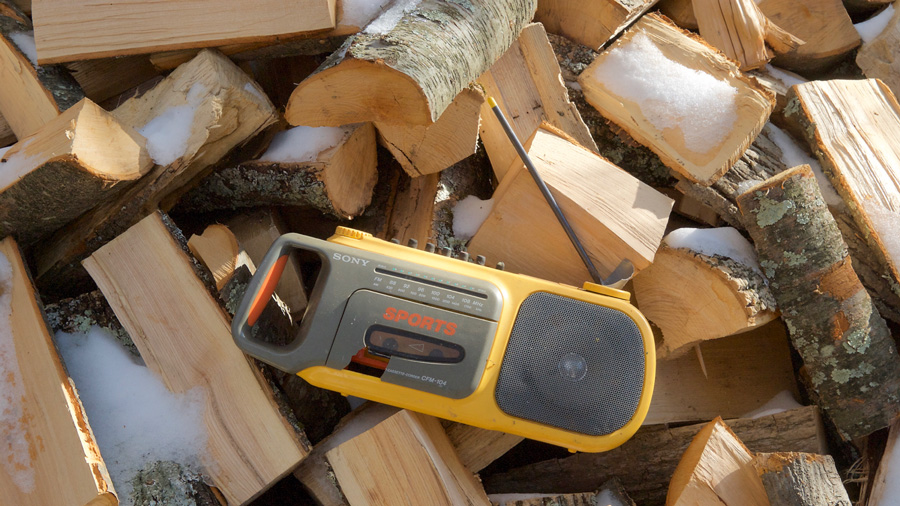
The temperature refuses to rise above the mid-thirties. I’m wearing my flannel jeans and an Elmer-Fudd, forest-green hunting hat with fleece-flaps covering my ears. Each time the clouds shift over the sun, the sky squeezes out a flurry of snow.
The six-foot lengths of black birch are too heavy to move and I’ve decided to cut and split them in place rather than haul the sections to the lean-to where we store our wood. I choose a chunk of the tree’s lower trunk as a chopping block.
My chainsaw, at times obstinate, thunders to life after only the fifth or sixth pull of its cord. Forty-five minutes later the sweet scent of wintergreen mingles with that of the dust from the saw. Twelve-inch billets litter the hardened soil between the remaining lengths of wood.
Black birch is called sweet birch by some. Others, similar to those Brothers of the Angle who insist on identifying mayflies by their Latin names, prefer Betula lenta. Small birds eat its seeds while twigs and catkins provide nourishment for rabbits, squirrels, and deer. Native Americans used the tree’s leaves and bark for a variety of ailments. Besides using its wood for furniture, past generations tapped the tree’s sap to brew birch beer.
This particular birch had grown to a height of at least sixty feet. Over the years, it leaned over an electric fence we installed to keep deer from devouring the azaleas, rhododendrons, and other bushes and plants inside four of the twelve acres surrounding our home. It also keeps our two black Labs out of trouble. Recently, a pileated woodpecker began drilling holes in the tree’s base, sealing its fate.
Putting aside the chainsaw, I set a radio on the tailgate of the truck and grab my maul. Trish bought me the radio a number of years ago. Although built for outdoor use, it’s engineers never anticipated the beating it would take while accompanying me into the woodlot adjacent to our home. More than once, an errant blow from a maul has sent a chunk of wood into its side. It has more dings than a traveling salesman’s suitcase and more stains than an auto mechanic’s work shirt. One year, a colony of ants found their way inside its plastic housing. The radio’s antenna is presently held together by duct tape. But like me, it abides.
When I was younger, I swung an eight-pound maul. These days, I rely on a maul with a four-pound head. The diameter of each log is eighteen inches or more, and my lower back protests each time I bend forward to carry one to the chopping block.
I flip up the fleece ear flaps and hang my canvas jacket on the nub of a nearby spruce. A sweatshirt keeps me warm now that I’ve been working over the wood for more than an hour. Imprinted on the back are the words: Sterling College, Woodbury Commons, Vermont. I purchased the hooded garment from the college’s bookstore while attending a one-week course on outdoor writing. Its dark green fabric has faded over the years, its cuffs frayed. Unsure as to when they appeared, there are a number of small holes peppered across the front. The heavy cotton material is stained with oil and gas, but I fear it will disintegrate if washed.
The opening bars of a tune draw me away from the cordwood. After leaning the maul against the side of the truck, I turn up the radio.
The Mississippi Delta
Was shining like a national guitar…
Raising a tin cup to my lips, I savor a mouthful of syrupy, nearly frozen, Coca-Cola as sweet as the image conveyed by Paul Simon’s unmistakable voice.
Seated on the tailgate, my legs swing with the rhythm of the music.
I’m going to Graceland, Graceland, Memphis, Tennessee.
A flock of juncos rises from the feeders around our house. They sweep over the tops of the trees as a beam of sunlight breaks through the clouds, and in that moment, all of the illness, isolation, and strife of the last year fall away. Tears fill my eyes.
Going to Graceland, Graceland, Memphis, Tennessee.
From the step outside our door, the dogs see me moving from side to side. As they race up the dirt drive, I slip off the tailgate, my feet hip-hopping toward the gate of the electric fence. I hold Finnegan’s front paws, the two of us dancing between the gate and the truck. Winslow Homer barks excitedly, waiting his turn. Tears are now streaming down my cheeks.
Whoa, oh, oh
Graceland, Graceland, Graceland
I’m going to Graceland.
A small family of deer stares from between a stand of beech. A breeze rustles the trees’ tan leaves that are withered, but still cling to the branches. As disapproving as any schoolmarm, the family’s matriarch, a well-groomed, good-looking doe, stamps a hoof while staring in our direction. A second doe, a bit smaller, probably her sister, stares in our direction. Behind the two adults linger three fawns born this spring. The smallest of the trio suddenly jumps straight up in the air. She kicks her back legs outward and then races in one direction only to veer off in another. The Matriarch turns her head in the direction of the little buckin’ bronco. The dogs look up at me, not sure what to do. Wondering if the little deer has diamonds on the soles of her shoes, I let out a laugh. The dogs wag their tails. The deer continue to stare.
As the final bars of the song lower to a whisper, I wipe the tears from my eyes. Like shadows under a full moon, the deer slip farther back into the woodlot. After ushering the dogs behind the gate, I return to the chopping block.